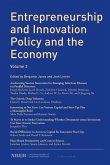Rigorous nonpartisan research on the effects of economic forces and public policy on entrepreneurship and innovation. Entrepreneurship and innovation are widely recognized as drivers of economic dynamics and long-term prosperity. This series communicates key findings about the implications of entrepreneurial and innovative activity across the economy. Entrepreneurship and Innovation Policy and the Economy, Volume 3, synthesizes key findings about entrepreneurial and innovative activity in the U.S. economy, conveying insights on contemporary challenges and providing an analytical base for policy design. In the first paper, Jorge Guzman, Fiona Murray, Scott Stern, and Heidi Williams examine regional innovation engines and highlight the place-specific actions, potential bottlenecks, and roles of different stakeholders in catalyzing entrepreneurship and innovation. Next, Lee Branstetter and Guangwei Li examine the challenges faced by the Chinese central government in implementing industrial policy to push the technology frontier while local governments and businesses deploy resources to advance their own, not necessarily aligned, interests. Turning to climate issues, James Sallee analyzes policies aimed at accelerating the energy transition by hastening the replacement of durable capital assets like automobiles and residential appliances that last for decades and slow the adoption of cleaner technologies. Joshua Gans studies cryptocurrencies and other crypto-token-based instruments and the broad range of government responses to them, particularly in the U.S. Finally, Ina Ganguli and Fabian Waldinger consider the effects of the Russian invasion of Ukraine on the human capital in the Ukrainian science community.
Hinweis: Dieser Artikel kann nur an eine deutsche Lieferadresse ausgeliefert werden.
Hinweis: Dieser Artikel kann nur an eine deutsche Lieferadresse ausgeliefert werden.








